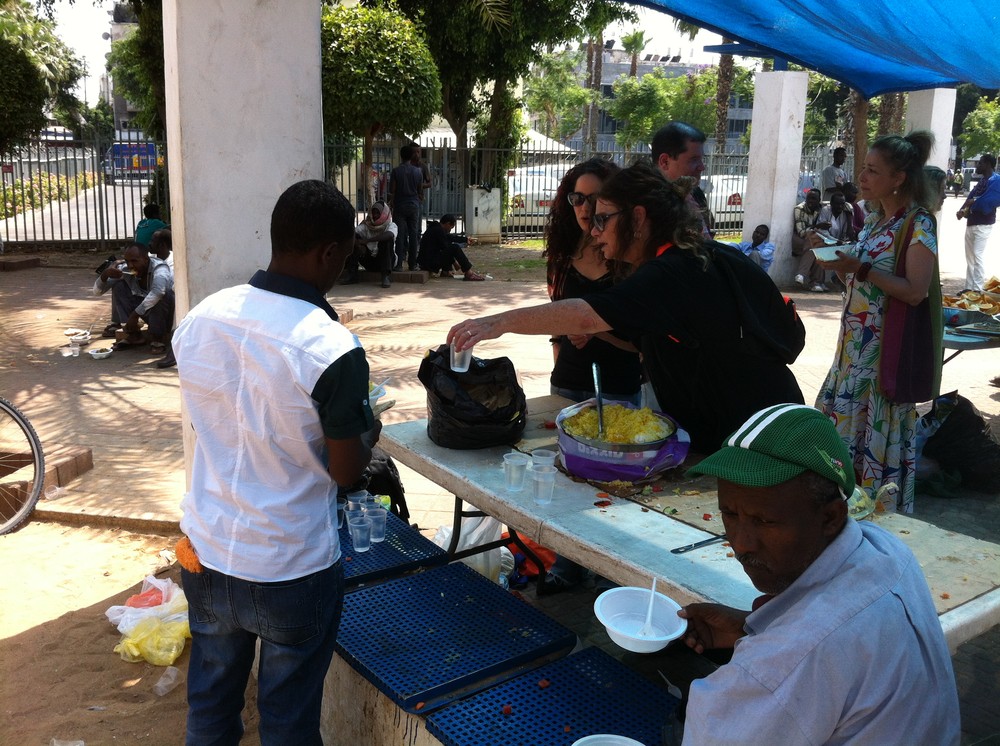David Bedein – Strange Campaign for Migrant Workers to Remain in Quasi-slave-like conditions
Still Relevant Today: Originally published J
Over the past two weeks, 10,000 Sudanese and Eritrean migrant workers have run high profile protests in Israel. Mistakenly described by the mainstream media as “asylum-seekers”, when, in fact, these people are job-seekers – ready to work under difficult conditions and with little remuneration.
Contractors from Israel’s hotels, restaurants and kibbutzim lured these desperate people from a continent away to work at 25% below the minimum wage, without medical or social benefits, and without any work permit whatsoever.
Israeli contractors who employ these migrant workers now hire PR firms and community organizers to their cheap labor look like they are “victims of persecution”
These contractors coordinate their campaign with “civil-liberties” groups that are funded through the New Israel Fund, the NIF, whose common goal is to prevent them from being deported.
In that context, according to sources in the Eilat municipality, the mass arrival of migrant workers has thrown an estimated 4,000 Israeli workers in Eilat out of work.
In a city of 49,000 people, that is a significant number of people to have been thrown out of work.
The Mayor of Eilat complains that “orders from above” prevent the law from being enforced against hotels that were engaging the services of workers, below minimum wage and without any benefits, which is a felony. Israeli police have not brought even one case against any hotel which illegally employs migrant workers.
Israel’s civil liberties organizations overlook the fact that Israeli contractors who exploit the migrant workers also hurt working people in Israel who are ready to work in minimum wage jobs
A case in point that our family was witness to: When my younger son finished his mandatory army service, a few years ago, he was ready to take any job, so long as he could earn some money before he decided what he was going to do with his life.
He went from work place to work place in Israel, shocked to hear that wages offered to him were far below the minimum wage, with no social or medical benefits.
What he heard from employers was that they “adjusted” their pay scale to “accommodate” cheap migrant workers, who take fees below the minimum wage, with no social or medical benefits.
One contractor did offer my son 17 shekels an hour, ten hours a day, 25% below minimum wage, with no social or medical benefits, as required by law.
An illegal migrant worker took the job instead.
In that context, the Israel Hotel Owners Association in Eilat has been negotiating with Israeli government officials to allow their hotels to hold on to their 1200 migrant workers.
One of the executives of the Israel Hotel Association appealed on Israeli media outlets, that “they cannot manage” without their migrant workers, claiming that the loss of migrant workers would mean that there would be no one around to wash dishes in the hotels- as if no one washed hotel dishes before the migrant workers showed up.
I visited a makeshift village for migrant workers that was acquired by contractors for the migrant workers just north of the Eilat, where hundreds of migrant workers live in crowded conditions. There, I witnessed migrant workers listening to lessons about Israeli civics. A New Israel Fund group hired social workers to teach migrant workers about how to become Israeli citizens, even though they do not qualify for Israeli citizenship under the “law of return” – Israel’s affirmative action law for Jewish immigrants to the Jewish national homeland.
However, if the migrant worker population continues to expand in Eilat – and there is every reason that we can expect that it will grow – migrant workers could form their own political party and influence policy decisions in a city whose total population is only 49,000.
At the dawn of 2014, the migrant worker population in Israel surpassed 200,000 people.
Across the globe, civil liberties organizations fight to put an end to the exploitation of migrant workers who are paid dirt wages with no benefits.
Yet in Israel today, contractors work with civil liberties organizations and their NIF sponsors fight for migrant workers to remain in quasi-slave like conditions.
David Bedein is an MSW community organizer and an investigative journalist. In 1987, Bedein established the Israel Resource News Agency at Beit Agron to accompany foreign journalists in their coverage of Israel, to balance the media lobbies established by the PLO and their allies. Mr. Bedein has reported for news outlets such as CNN Radio, Makor Rishon, Philadelphia Inquirer, Los Angeles Times, BBC and The Jerusalem Post,
For four years, Mr. Bedein acted as the Middle East correspondent for The Philadelphia Bulletin, writing 1,062 articles until the newspaper ceased operation in 2010. Bedein has covered breaking Middle East negotiations in Oslo, Ottawa, Shepherdstown, The Wye Plantation, Annapolis, Geneva, Nicosia, Washington, D.C., London, Bonn, and Vienna. Bedein has overseen investigative studies of the Palestinian Authority, the Expulsion Process from Gush Katif and Samaria, The Peres Center for Peace, Peace Now, The International Center for Economic Cooperation of Yossi Beilin, the ISM, Adalah, and the New Israel Fund. Since 2005, Bedein has also served as Director of the Center for Near East Policy Research. A focus of the center’s investigations is The United Nations Relief and Works Agency for Palestine Refugees in the Near East (UNRWA).
In that context, Bedein authored Roadblock to Peace: How the UN Perpetuates the Arab-Israeli Conflict – UNRWA Policies Reconsidered, which caps Bedein’s 28 years of investigations of UNRWA. The Center for Near East Policy Research has been instrumental in reaching elected officials, decision makers and journalists, commissioning studies, reports, news stories and films. In 2009, the center began decided to produce short movies, in addition to monographs, to film every aspect of UNRWA education in a clear and cogent fashion.









